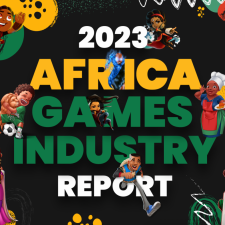Nigeria-based studio Maliyo Games recently published the Africa Games Industry Report which sheds light on the dynamic landscape of the gaming industry in Africa. With nearly 200 million gamers spending hundreds of millions of dollars primarily on mobile platforms, the report offers a comprehensive overview of the sector.
Presented by Maliyo Games' CEO Hugo Obi and Nordicity's CEO Kristian Roberts at Africa Games Week, the report provides an overview of the global games industry, key African demographic as well as an overview of some regional and emerging markets to understand their similarity with the African industry.
Market overview and spending
According to the Newzoo report of 2023, Africans spend an average of $6 per year on games, predominantly through in-app purchases on mobile games. Sub-Saharan Africa alone sees total in-app purchase spending of $778.6 million, constituting 90% of all games revenue in the region. Notably, South Africa leads with an average revenue per user of $12 per year.
The total spending on games in 2022 across major markets includes South Africa ($289.5 million), Nigeria ($184.5 million), Ghana ($41.7 million), Kenya ($38.8 million), and Ethiopia ($35.2 million). The gaming industry in Africa is obviously on the rise, with a recent report by Newzoo and Carry1st predicting that Sub-Saharan Africa is set to spend over $1 billion on games for the first time in 2024.
Audience and player population
The Africa games industry report reveals a significant increase in gamers across Sub-Saharan Africa, growing from 77 million in 2015 to 186 million in 2021. Mobile gaming dominates with 95% of the playing population (177 million) favoring mobile games, and 34% opting for paid video games. The top five gaming markets include Nigeria (46.5 million gamers), South Africa (23.9 million), Ethiopia (15 million), Kenya (11.8 million), and Ghana (8.3 million).
The African gaming market reflects rich diversity, with over 3,000 distinct ethnic groups and more than 2,000 languages spoken. English, French, Swahili, Hausa, and Arabic are among the most spoken languages, emphasizing the unique challenges and opportunities presented by the continent.
Demographics and growth potential
Africa boasts a youthful population with a median age of 19.7 years compared to the global median of 30.4. Approximately 60% of Africa's 1.4 billion people are under the age of 18 according to the report, which indicates a significant opportunity for growth. The continent is expected to be the only region globally where the population continues to grow significantly, potentially doubling by 2050. This demographic shift contributes to Africa's growing buying power, including its consumption of video games.
A growing development landscape
The report showcased the results of the Africa Game Developer Survey which despite being based on a relatively small sample of 118 respondents, provides insights into the development landscape. Notably, 78% of respondents are working on mobile games, 70% on PC games, and only 18% on console games, with just 1% developing for Nintendo Switch.
Surprisingly, many studios focus on both PC and mobile development, highlighting the adaptability of developers in navigating market challenges. Unity stands out as the most widely used game engine at 64%, followed by Unreal at 14%, and Godot at 8%. The industry is relatively young, with 63% of respondents having five years or less of development experience.
Three main challenges
Financial challenges persist for African developers, as only 59% have secured external investment for their projects. Of those funded, 57% raised less than $100,000. Moreover, only 36% earn income solely from game development, with many developers relying on alternative sources of income due to the presence of hobbyists and part-time developers.
Infrastructure challenges such as unstable power supply (reported by 60% of respondents) and unaffordable internet access (reported by 57%) also contribute, underscoring the need for improvements in supporting digital creative industries across the continent.
The report also highlighted challenges such as the 3,000 distinct ethnic groups and over 2,000 languages spoken continent-wide. While many Africans are fluent in English and/or French, Swahili leads as the most spoken indigenous language (200 million speakers). Hausa dominates in Western Africa (115 million speakers), and Arabic in Northern Africa (100 million speakers).
Emerging markets
The report found that although the games industry in Africa is, “Comparatively small at present," keeping an eye on the success of other regions could help it grow a cluster of video game business and activity. Four countries including Brazil, India, Israel and Turkey were outlined as, “Strong players on the global video games stage," behind region leaders like Europe, North America, Japan and Asia.
Brazil leads the Latin American games market, boasting 12,000 workers and 1,000 studios contributing to 57% of global industry revenue, reaching $1.3 billion in 2022. India follows with seven major studios and an expected market growth from $3 million in 2023 to over $6 million by 2028. Israel, a newcomer, houses six major studios and around 200 companies with 14,000 employees, favouring mobile gaming with an estimated revenue of $9 billion in 2021. Turkey's gaming ascent began in the 2010s, driven by high smartphone usage, featuring eight major studios, 2,943 publishers, and over 10,893 games.
While the African gaming industry faces challenges, the report highlights its transformative growth and potential. With increasing spending, a youthful demographic, and a surge in the number of gamers, Africa emerges as a vibrant market for the global gaming industry.
You can access the full report here.

















